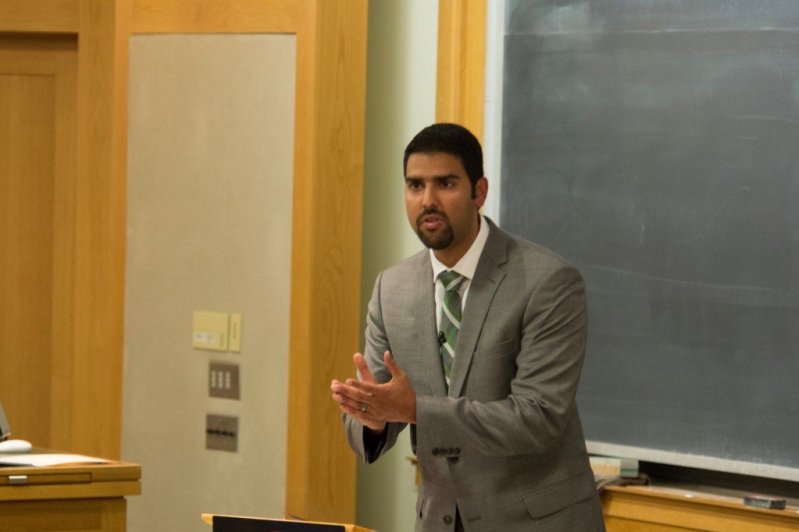
In light of the recent controversy surrounding the hijab-wearing Wheaton College professor, former-Muslim-turned-Christian-scholar Nabeel Qureshi has argued that while Muslims and Christians do not worship the same god, Christ-followers should stop demonizing those who disagree with them on the issue.
As reported by the Gospel Herald, Wheaton College suspended political science professor, Larycia Hawkins, after she wore the Muslim headdress to show solidarity with Muslims, and then explained, "I stand in religious solidarity with Muslims because they, like me, a Christian, are people of the book. And as Pope Francis stated last week, we worship the same God."
In an op-ed shared earlier this week, Qureshi, author of the New York Times Best-Seller, Seeking Allah, Finding Jesus and itinerant speaker with Ravi Zacharias International Ministries, argued that while Hawkins is wrong -- Muslims and Christians do not, in fact, worship the same God -- the issue is actually quite complex.
For several years after leaving Islam and converting to Christianity, Qureshi himself maintained the belief that Muslims worshiped the same God as Christians; he simply believed Muslims were "wrong about what He is like and what He has done."
He explained this belief by drawing comparisons between the god of Islam and the God of Christianity: "The Quran asserts that the Torah and the Gospel are inspired scripture and that Jews and Christians are people of the Book. The Quran tells Muslims to say to them, 'our God and your God is One, and unto Him we surrender' (29.46). If the Quran asserts that Muslims worship the same God as Jews and Christians, does that not settle the matter?"
After studying the Scriptures, however, Qureshi's perspective shifted: "The similarities between the God of Islam and the God of Christianity are fairly superficial, and at times simply semantic...What God has done or whom He has sent is far less of a defining characteristic than what He is and who He is; though Islam and Christianity overlap at points on the former, they differ fundamentally on the latter."
Now, he believes that the phrase "Muslims and Christians worship the same God" is "only true in a fairly uncontroversial sense."
"There is one Creator whom Muslims and Christians both attempt to worship. Apart from this banal observation, Muslims and Christians do not worship the same God," he writes. "This assertion is not only untrue but also subverts Christian orthodoxy in favor of Islamic assertions."
He goes on to identify several key differences between the two Gods: First, Christians believe Jesus is God, but the Quran condemns this belief as heretical.
"For Christians, Jesus is certainly God, and for Muslims Jesus is certainly not God. How can it be said that Christians and Muslims worship the same God?" he writes.
Second, Jesus states that God is our Father, yet the Quran denies that Allah is a father -- "In fact, in 5.18, the Quran tells Muslims to rebuke Jews and Christians for calling God their loving Father because humans are just things that God has created," Qureshi explains.
Third, Islam condemns worship of the Trinity and instead supports the Tawhid, or the absolute oneness of God.
"Tawhid specifically denies the Trinity, so much so that it is safe to say the doctrine of God in Christianity is antithetical to the doctrine of God in Islam. Not just different but completely opposed to one another," Qureshi writes.
These three points alone prove that the Christian God is "not just different from the Muslim God; He is fundamentally incompatible."
"According to Islam, worshiping the Christian God is not just wrong; it sends you to Hell. They are not the same God," he writes. "Christians worship a Triune God: a Father who loves unconditionally, an incarnate Son who is willing to die for us so that we may be forgiven, and an immanent Holy Spirit who lives in us. This is not what the Muslim God is; it is not who the Muslim God is; and it is not what the Muslim God does. Truly, the Trinity is antithetical to Tawhid, fundamentally incompatible and only similar superficially and semantically. Muslims and Christians do not worship the same God."
Qureshi goes on to applaud Wheaton for giving Hawkins time off to consider the implications of her statement, as she is "allowing Islamic assertions to subvert the importance of essential doctrine."
However, he urges believers to refrain from condemning her for the mistake, as such issues are "murky", and instead welcome open dialogue regarding such issues: "One can both love Muslims and insist that the God they worship is not the same as the Christian God."







